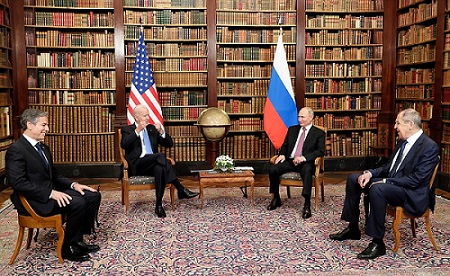U.S. President Joe Biden and Russian President Vladimir Putin agreed at their first summit on Wednesday to resume arms control talks and post back ambassadors to each other's capitals in the near future.
The summit at the lakeside Villa La Grange in Geneva lasted for close to four hours. The scheduling of separate news conferences, however, deprived the occasion of the bonhomie that accompanied a similar 2018 meeting between Putin and then US President Donald Trump. There was also no joint meal to add a cordial touch to the meeting between the two heads of state.
Putin, who was first to brief reporters, said “I don’t think there was any kind of hostility.” But he noted that there were “divergent opinions” on fundamental issues. The two sides, he said, were determined to work “to understand each other” and find areas of convergence.
Also read: Why is the Biden-Putin summit important to India?
He also said Russia and the United States shared a responsibility for nuclear stability, and would hold talks on possible changes to their recently extended New START arms limitation treaty.
Putin refused to budge on issues such as the arrest of opposition leader Alexei Navalny and Russia's increased military presence near Ukraine's eastern border. He also dismissed U.S. suggestions that unidentified Russians were behind a series of cyber-attacks in the United States, according to a Reuters report from Geneva.
Putin said Navalny had ignored the law and had known what would happen if he returned to Russia from Germany, where he had received treatment after he was poisoned in his home country. Putin also accused Ukraine of breaking the terms of a ceasefire agreement with pro-Russian rebels in the eastern part of the country.
He said Washington and Moscow would start consultations on cybersecurity, but insisted most cyber-attacks on Russia came from the United States.
Also read: Biden and Putin shake hands in Geneva, hope for a 'productive' meeting
The progress in arms control talks is a welcome step and takes forward the groundwork that had already started with Biden coming to power. Russia and the United States had in February extended for five years the New START treaty, which caps the number of strategic nuclear warheads they can deploy and limits the land- and submarine-based missiles and planes to deliver them.
Both sides had said in advance of the summit that they hoped for more stable and predictable relations, even though they were at odds over everything from arms control and cyber-hacking to election interference and Ukraine.
Relations between Moscow and Washington have been deteriorating for years, especially after Russia's annexation of Crimea from Ukraine in 2014. U.S. charges of meddling in the 2016 election that brought Donald Trump to power was another major friction point.
The relations hit an all-time low in March when Biden said he thought Putin was a "killer", prompting Russia to recall its ambassador from Washington for consultations. The United States then retaliated by recalling its ambassador from Moscow in April.
Putin said on Wednesday that he had been satisfied by Biden's explanation of the remark.


















